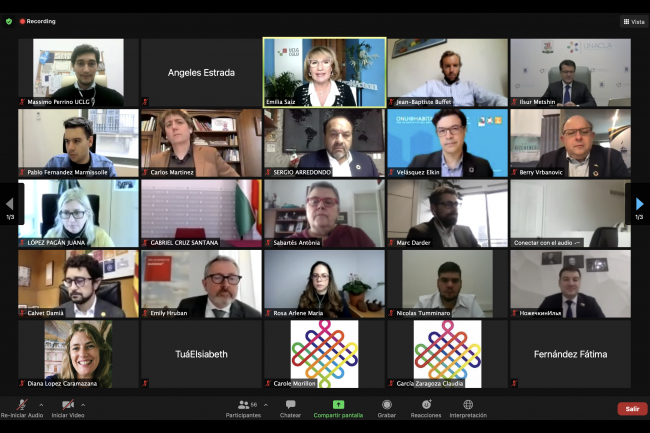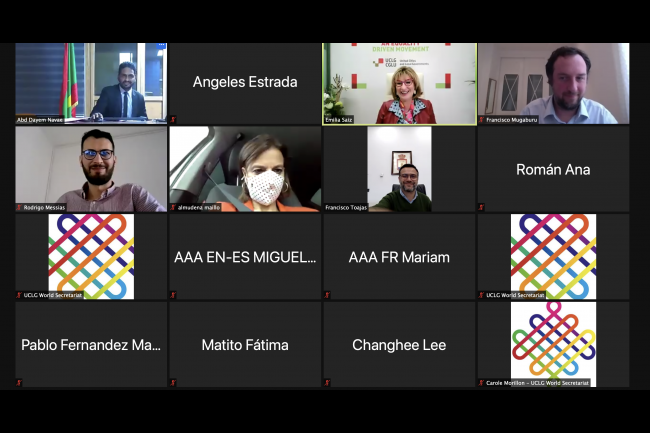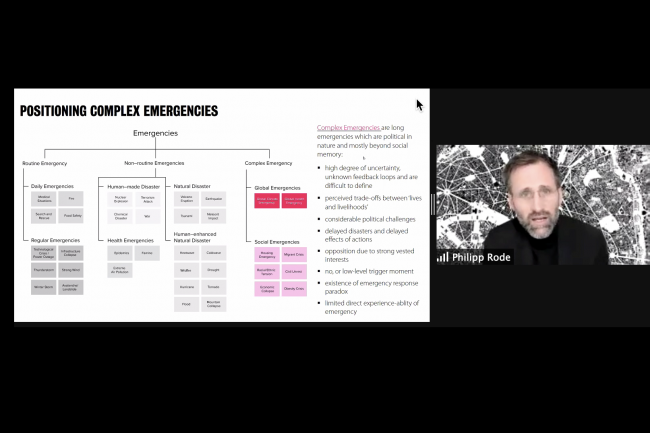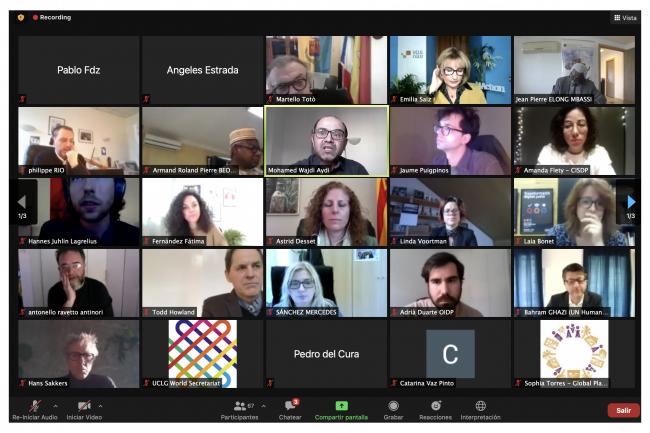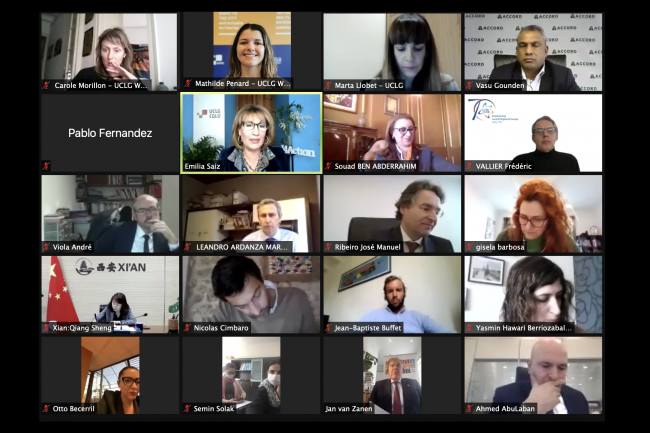Highlights from 12 February 2021
The Policy Council on “Implementation of the New Urban Agenda” convened on Friday, 12 February. The Council is co-chaired by: Carlos Martínez Mínguez, Mayor of Soria, Spain, and Envoy of the UCLG Presidency on the New Urban Agenda (NUA); Ilsur Metshin, President of the United Nations Advisory Committee for Local Authorities (UNACLA); and Thembisile Nkadimeng, Mayor of Polokwane, South Africa, President of the South African Local Government Association (SALGA), and UCLG Co-President.
UCLG Secretary-General Emilia Sáiz opened the meeting, recalling the creation of this Policy Council is one of the key outcomes of the November 2020 UCLG World Council meeting. She emphasized the urban era is not just about big cities, but territoriality in all its aspects, including intermediary cities and the urban-rural continuum. It is about “leaving no one… and no place… behind” she said.
Co-Chair Metshin delineated the role of UNACLA as a liaison platform for strengthening the dialogue between local authorities and the UN system in relation to the NUA. He recalled the next UN Secretary-General report on progress made in implementing the NUA is due in 2022 and encouraged local authorities and UCLG to actively participate in the preparation of national reports to inform it.
Co-Chair Martínez Mínguez said territorial perspectives should guide NUA implementation, noting the role of small and medium-sized cities in the energy transition. He called for creating a mechanism for citizen participation in the work of UCLG.
Co-Chair Nkadimeng underscored the need to foster inclusive local service provision and ensure accessibility for women.
Elkin Velásquez, UN-Habitat, said much related to the NUA implementation review occurs at the regional level. In relation to the SDGs, he encouraged local authorities to conduct Voluntary Local Reviews as a means to better feed local perspectives into Voluntary National Reviews. “We need to think long term while acting in the short term” he said. He called for leveraging the new openness for innovation brought about by the COVID-19 pandemic.
Key points raised during the discussion included:
- the pandemic has boosted centralization of power, and local governments must be better engaged in developing recovery packages;
- seizing the momentum for change brought about by the pandemic to radically change unsustainable systems;
- using stakeholder consultations to co-create plans for achieving transformational change, and engaging young people in the process; and
- disaggregating data, among others, between cities and rural areas, as well as by gender, age, and race, to ensure no one is left behind and to allow for better assessments of policy effectiveness.
Closing the session, Secretary-General Sáiz noted many speakers pointed to the Policy Council on “Territorial Multilevel Governance and Sustainable Financing” as a group to exchange with. She shared her intention to bring the different Policy Councils together to help shape UCLG’s inputs to the NUA review.
Visit our coverage for Friday 12 February 2021.
IISD, through its Earth Negotiations Bulletin (ENB) Meeting Coverage, will produce a summary report from the meeting on Sunday, 14 February 2021.
Highlights from 11 February 2021
The Policy Council on “Safer, Resilient and Sustainable Cities, Capable of Facing Crises” convened on Thursday, 11 February. The Council is co-chaired by Fatimetou Abdel Malick, President of the Nouakchott Regional Council, Mauritania, Johnny Araya, Mayor of San José, Costa Rica, Co-President of UCLG, and Sami Kanaan, Mayor of Geneva, Switzerland.
UCLG Secretary-General Emilia Sáiz opened the meeting, highlighting that the work of the Policy Council not only relates to disaster preparedness but, more broadly, to changing our relationship with ecosystems and shifting development models. She noted the concept of “safer” cities goes beyond security aspects and also relates to social cohesion.
Co-Chair Araya said the COVID-19 pandemic, having disastrous consequences on poverty reduction efforts, underscores the need for comprehensive visions of the concept of resilience rather than those centered solely on climate change.
Co-Chair Kanaan called for more operational work on the issue of resilience. He proposed hosting a meeting of the UCLG Working Group on Territorial Prevention and Management of Crises, which he co-chairs, in Geneva, as soon as health restrictions are lifted. He emphasized UCLG could leverage Geneva’s position as a hub for international organizations for advocacy purposes.
Mami Mizutori, Special Representative of the UN Secretary-General for Disaster Risk Reduction and Head of the UN Office for Disaster Risk Reduction (UNDRR), said the challenges to building more resilient cities are clear and not new. To overcome them, she stressed the need to reduce the root causes of risks, inves in risk governance, and develop multi-hazard approaches. She delineated UNDRR’s “Making Cities Resilient 2030” initiative, which, recognizing that cities are at different steps in the pathway to resilience, aims to support cities in: enhancing knowledge on risk and resilience; putting in place DRR strategies; and implementing actions to strengthen resilience.
Bernadia Irawati Tjandradewi, Secretary-General of UCLG Asia-Pacific, moderated a discussion with policy makers, underscoring the multiple dimensions of crises such as the COVID-19 pandemic. Key points raised during the discussion included:
- limitations to public service provision in the context of the pandemic, especially for vulnerable groups such as children with special education needs;
- measures taken in response to the pandemic, such as closing borders, threaten food security in certain regions;
- using simulation tools to develop disaster plans and crisis coordination mechanisms;
- conceptualizing resilience more broadly, notably to encompass notions of social cohesion; and
- reinforcing local-level capacities to better respond to crises.
Closing the session, Secretary-General Sáiz summed up key points raised during the session, including that transportation is not just about “moving people,” but is also a vital contributor to food security in isolated regions. She noted these will be further discussed at the upcoming Annual Retreat.
Visit our coverage for Thursday, 11 February 2021.
IISD, through its Earth Negotiations Bulletin (ENB) Meeting Coverage, will produce a summary report from the meeting on Sunday, 14 February 2021.
Highlights from 10 February 2021
The Policy Council on “Territorial Multilevel Governance and Sustainable Financing” convened on Wednesday, 10 February. It is co-chaired by Pablo Jurado, President, Consortium of Provincial Autonomous Governments, Ecuador, Geoff Makhubo, Mayor of Johannesburg, South Africa, and Núria Marín, President of the Barcelona Provincial Council, Spain.
Opening the meeting, UCLG Secretary-General Emilia Sáiz recalled discussions will serve as input for technical work taking place in the context of the UCLG Annual Retreat, which will meet from 15-22 February 2021.
Noting that his city of Prince George, Canada, is situated on the traditional territory of the Lheidli T'enneh First Nation, Garth Frizzell, President of the Federation of Canadian Municipalities (FCM), lamented the chronic underfunding of local authorities. He called for more balanced distribution of national resources to enhance local-level financial capacity and support investments for updating water and recreational infrastructure, especially in underserved communities.
Philipp Rode, Executive Director, LSE Cities, highlighted emergencies, such as COVID-19, lead to changes in the distribution of power among governmental and private actors, fluctuating privatization and deprivatization trends, shifting expenditure priorities, and loss of income for local governments. He underscored emergency governance must acknowledge the scale of the problem, focus on social justice and empathy, and embrace a systems approach.
David Jackson, UN Capital Development Fund (UNCDF), said sub-national levels of government are critical for transformation, particularly in developing countries. He called for sub-national level capital markets, highlighting the difficulty for subnational entities to raise capital at global market rates.
Barbara Samuels, Executive Director, Global Clearinghouse for Development Finance, and UCLG Ubuntu Advisor, explained suppliers of development finance increasingly see cities as battlegrounds for successful projects. She proposed developing a policy paper that defines priorities, instruments, and tools for local development finance for UCLG’s advocacy work in the global multi-stakeholder financing space.
Key points raised during the ensuing discussion included:
- enhancing local governments’ financial capacity in a sustainable manner;
- developing shared cross-party visions for the future of cities;
- increasing attention to the urban-rural continuum and the revitalization of small municipalities;
- using the COVID-19 pandemic as an opportunity to address apparent bottlenecks, notably related to the fragmentation of competencies, a lack of coordination, and complicated funding schemes; and
- local governments’ participation in the development of national recovery packages, including in decisions related to spending priorities.
Closing the session, UCLG Secretary-General Sáiz reiterated the upcoming Annual Retreat will further discuss issues raised, including ways to finance “the green future that we want to see.” Policy recommendations, she noted, will be developed prior to the UCLG World Council scheduled for the end of 2021.
Visit our coverage for Wednesday, 10 February 2021.
IISD, through its Earth Negotiations Bulletin (ENB) Meeting Coverage, will produce a summary report from the meeting on Sunday, 14 February 2021.
Highlights from 9 February 2021
The Policy Council on “The Right to the City and Inclusive Territories” convened on Tuesday, 9 February, to provide a space for local leaders to deliberate on key issues to address in 2021. The Policy Council is co-chaired by Armand Béouindé, Mayor of Ouagadougou, Burkina Faso, Claudia López, Mayor of Bogotá, Colombia, and Philippe Rio, Mayor of Grigny, France.
UCLG Secretary-General Emilia Sáiz opened the meeting, recalling that this Policy Council is the result of long-standing partnerships with civil society organizations and that, in its previous composition, it had triggered discussions on issues such as housing, digital rights, and human mobility and migration. Pointing to UCLG’s work on developing a “Pact for the Future,” she highlighted discussions held in the Policy Council will especially help shaping the Pact’s axis of “Caring for People.”
Co-Chair Rio emphasized the value of the 2011 UCLG Global Charter-Agenda for Human Rights in the City and noted the objective to revise the charter ahead of the UCLG Congress in Daejeon, Republic of Korea, in 2022.
Co-Chair Béouindé emphasized the need for local governments to enhance their capacity to address challenges, such as rising inequality in the context of the COVID-19 pandemic. He highlighted that cooperation in the context of the UCLG can contribute to this.
In a keynote address, Todd Howland, Office of the UN High Commissioner for Human Rights (OHCHR), welcomed the partnership between OHCHR and UCLG as a valuable opportunity to identify good practices, better understand challenges, and ultimately contribute to improving respect for human rights globally.
Hannes Lagrelius, World Blind Union, provided a second keynote address. He underscored that true inclusion cannot be achieved without ensuring accessibility. Pointing to the UCLG Policy Paper on Inclusive and Accessible Cities, among other frameworks, he said UCLG action on this issue can inspire its members to act accordingly.
In the remainder of the session, moderated by Jean-Pierre Elong Mbassi, Secretary-General of UCLG Africa, local representatives shared their perspectives on key issues related to the Policy Council’s thematic focus. Key points included:
- local governments, being closest to people on the ground, have a key role to play in ensuring respect for human rights;
- a new generation of rights is emerging, including digital rights;
- the COVID-19 pandemic highlights persistent inequalities, notably in terms of gender equality and accessibility for persons with disabilities;
- a new approach to migration governance is needed, centering on solidarity and respect for human rights; and
- local and regional leaders need to be supported in stepping up for human rights, including by better tackling online hate speech.
In closing, Secretary-General Sáiz said the UCLG Annual Retreat, taking place from 15-22 February 2021, will discuss many of the topics raised during the session, including how to further build on the 2014 Charter of Lampedusa and the 2011 UCLG Charter-Agenda on Human Rights. She said participants will also discuss new concepts, such as digital rights, and the evolving definition of citizenship given, among others, the migrant crisis.
Visit our coverage for Tuesday, 9 February 2021.
IISD, through its Earth Negotiations Bulletin (ENB) Meeting Coverage, will produce a summary report from the meeting on Sunday, 14 February 2021.
Highlights from 8 February 2021
The Policy Council on “Opportunities for All, Culture and City Diplomacy: Keys to Sustainable Development and Peace” was the first of five United Cities and Local Governments (UCLG) Policy Councils to meet this week.
UCLG Secretary-General Emilia Sáiz opened the meeting, emphasizing that this Policy Council, with its focus on city diplomacy for sustainable development, touches upon the very DNA of UCLG. She recalled the aim for Policy Councils to provide a space for deliberation among political voices and to trigger developments on key issues of importance for UCLG.
Policy Council Co-Chairs Souad Ben Abderrahim, Mayor of Tunis, Tunisia, and Jan Van Zanen, UCLG Co-President and Mayor of The Hague, the Netherlands, provided opening remarks.
Ben Abderrahim underscored the importance of multilateral and multi-level cooperation for strengthening trust among partners and reducing adverse effects of rival competition. She emphasized cities as motors for producing locally viable solutions to global challenges and driving the sustainability transition.
Van Zanen highlighted the COVID-19 pandemic has deepened existing inequalities and constrained the capacity of local governments to support their struggling citizens. He noted the need to enhance synergies and cooperation with other initiatives aimed at fostering sustainable and peaceful development. He pointed to the UCLG Peace Prize, which celebrates innovative local-level conflict prevention initiatives.
In a keynote, address, Vasu Gounden, Executive Director of the African Centre for the Constructive Resolution of Disputes (ACCORD), urged cities to develop conflict resolution processes, as growing urban populations will increase pressure on limited resources, heightening the risk of conflict.
In the remainder of the session, moderated by Frédéric Vallier, Secretary General, Council of European Municipalities and Regions, policy councillors and focal points shared their perspectives on key issues related to the Policy Council’s thematic focus. Speakers highlighted, among others:
- the critical role of culture in creating a sense of community and strengthening social cohesion;
- the need to support the cultural sector amid the COVID-19 pandemic, and to develop innovative tools for making cultural activities more accessible;
- the Rome Charter on the right to participate fully and freely in cultural life, as a key outcome of UCLG’s work on culture; and
- the importance of decentralized cooperation to foster mutual learning.
Closing the meeting, Secretary-General Sáiz pointed to interlinkages between issues raised in the Policy Council and work of UCLG Committees, noting the Committee on Culture is advancing work on implementing the Rome Charter and plans on addressing linkages between culture and climate change. Building on members’ suggestions, she indicated that future Policy Council sessions will focus on specific topics to allow for more in-depth discussions. She said the take-aways from the session will feed into discussions at the UCLG Annual Retreat, taking place from 15-22 February 2021, and will be shared with the UCLG regional sections.
Visit our coverage for Monday, 8 February 2021.
IISD, through its Earth Negotiations Bulletin (ENB) Meeting Coverage, will produce a summary report from the meeting on Sunday, 14 February 2021.
